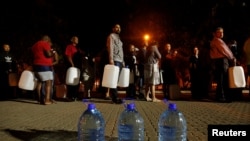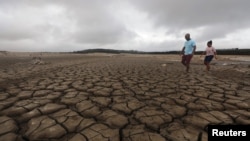In January, officials in Cape Town, South Africa warned that the city’s usable water supply would be gone by April 21. The heavily-publicized date was called “Day Zero.”
The city on South Africa’s southwestern coast has been fighting the worst drought in a century. Cape Town is home to more than four million people.
Earlier this month, officials canceled the prediction for Day Zero. They now said it would not take place until 2019. The action came after drops in dam levels decreased and rainfall was expected to arrive in coming months.
Severe water restrictions remain in place for the city. Each Cape Town individual is limited to 50 liters of water each day. Officials have said the restrictions will continue until water supplies rise to acceptable levels.
The water crisis has left a lasting mark on Cape Town. The public has learned valuable lessons in water saving and administration.
Claire Pengelly works for Green Cape, a not-for-profit group that has advised city officials through the long drought. She said some people have praised the delay of Day Zero, saying efforts to deal with the drought have worked.
“We’ve been able to save, and it means that we will get through this summer,” she said.
However, Pengelly added, other people think they were tricked. They believe, she said, that Day Zero was a marketing campaign. Officials launched it, they argue, to get people to change behaviors although the city was never in real danger of complete water loss.
Pengelly said she thinks the threat of Day Zero turned out to be a good thing because it showed people the great need to conserve. She noted that even once the threat of Day Zero passed, overall water usage did not rise in Cape Town.
Deputy Mayor Ian Neilson has defended the city’s decision in January to declare April 21 would be Day Zero. He said at the time, water usage in the city was still at a very high level. Only after stronger restrictions were ordered did the situation turn around.
Claire Pengelly said she has learned to live with one-minute showers and other water-saving measures at home. But she also said she dreams of a day when she can once again take a long, hot bath – something she has not done in over a year.
I’m Bryan Lynn.
Anita Powell reported this story for VOA News. Bryan Lynn adapted it for Learning English. Caty Weaver was the editor.
We want to hear from you. Write to us in the Comments section, and visit our Facebook page.
_____________________________________________________________
Words in This Story
drought – n. long period of time during which there is very little or no rain
perspective – n. a way of looking at or thinking about things
impact – n. a powerful or major influence
shower – n. act of washing the body with a shower
bath – n. act of washing the body inside a container filled with water







